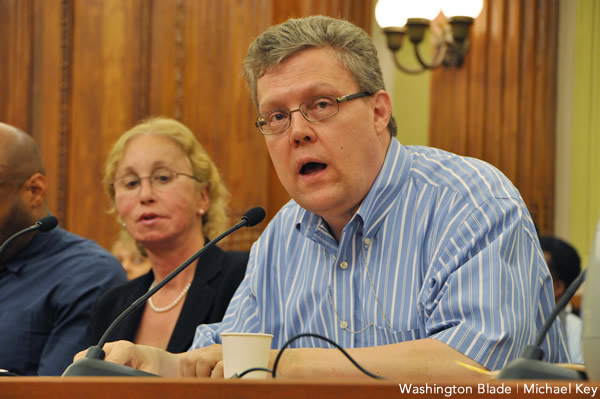Local
Third activist released from Kameny lawsuit
Attorneys for estate say picket signs, other property still missing


Gay activist, Richard Rosendall, has been released from the Kameny estate lawsuit. (Washington Blade file photo by Michael Key)
Gay activist Richard Rosendall, a longtime friend of the late gay rights leader Frank Kameny, testified in court on May 11 that he has returned several items he “borrowed” from Kameny’s house shortly after Kameny died last October.
Rosendall appeared in a courtroom at the D.C. Superior Court’s Probate Division in response to a show cause order obtained by attorneys representing Timothy Clark, the personal representative and main heir of Kameny’s estate.
Through his attorneys, Clark has charged in a lawsuit that Rosendall and three other Kameny friends and associates removed without permission documents and other property belonging to the Kameny estate from Kameny’s house in Northwest Washington shortly after Kameny died last Oct. 11.
“After the death of Franklin Edward Kameny, I borrowed, and held in my possession and control, certain personal properly lawfully belonging to the Estate of Franklin Edward Kameny,” Rosendall stated in a sworn affidavit submitted to the court two days prior to the hearing.
He identified in the affidavit and on the witness stand the items borrowed as “a copy of Dr. Kameny’s 1961 brief for the Supreme Court of the United States; a letter to or from [U.S. Supreme Court] Justice [Lewis] Powell; several letters between Dr. Kameny and an Army official concerning [the Gay and Lesbian Activists Alliance’s] wreath-laying ceremonies at Arlington Cemetery; a box of business cards; and three or four books.”
Two of the other three named in the lawsuit, Charles Francis and Bob Witeck, have returned items they acknowledged belonging to the estate. Rosendall testified at the May 11 hearing that he helped Francis carry 17 boxes filled with papers and other items from Kameny’s house, which he said Francis placed in a storage facility for safekeeping. Rosendall has said Clark, who lived in the house with Kameny for 19 years, gave them permission to enter the house.
Upon their return of the property last month, attorneys for the estate dismissed Francis and Witeck from the lawsuit.
Similar to Rosendall, Francis and Witeck have said they took possession of the items to ensure they remain safe and properly preserved during a period of confusion following Kameny’s death. Each has said they planned all along to return the items to the estate. Witeck has said the only items he took were several photographs.
Rosendall testified that he returned the items he borrowed to Francis, who returned them to the Kameny estate last month.
“The Estate of Dr. Franklin E. Kameny is satisfied that Richard J. Rosendall has returned the items that Mr. Rosendall removed from Dr. Kameny’s home shortly after Dr. Kameny’s death,” said Glen Ackerman, one of the attorneys representing Clark and the Kameny estate, in a statement to the Blade on Monday.
“However, there are still a number of important historical items still missing from the Estate, including Dr. Kameny’s collection of buttons, handmade picket signs and posters,” Ackerman said in the statement. “The Estate is attempting to recover these missing historically significant assets as a part of the probate process and to make certain that Dr. Kameny’s wishes as recorded in his Last Will and Testament are carried out fully.”
In his will, Kameny bequeathed his papers to the Library of Congress while leaving all other possessions, including his house and car, to Clark.
In response to questions at the May 11 court hearing by Kameny estate attorney J. Max Barger, Rosendall disputed claims by the estate that Clark believes as many as 100 picket signs were taken from the house after Kameny’s death. Rosendall told Barger he doubted that many picket signs had been in the house.
Kameny and his fellow gay activists used the picket signs in their historic gay rights demonstrations outside the White House and other government buildings in the early 1960s, the first such demonstrations ever held.
Barger and Ackerman told Judge John Campbell, who presided over the hearing, that the picket signs and buttons, which are inscribed with gay rights messages, have an important historic value and must be accounted for during the probate process for the estate.
Rosendall testified that he has possession of one of the picket signs, which he said Kameny gave permission for him to take several years prior to his death. He said Kameny also gave him a signed copy of The Homosexual Citizen, a publication of the Mattachine Society of Washington, which Kameny co-founded in 1961.
Mindy Daniels, Rosendall’s attorney, expressed concern during the hearing that the estate was confusing items that Kameny gave to Rosendall and others with items belonging to the estate. She noted items given away by someone prior to their death are not part of their estate after the person dies.
Ackerman told Campbell that Francis, Witeck, Rosendall and Marvin Carter, another Kameny friend, had not responded to earlier efforts by the estate to obtain from them an inventory of the items they allegedly took from Kameny’s house following Kameny’s death.
Daniels said the estate never contacted Rosendall about these items until it filed suit against him in March. Ackerman said the estate did make attempts to reach Rosendall and the other three men.
The estate named Carter as a defendant in one of the lawsuits seeking the return of items taken from Kameny’s house and petitioned the court to order him to appear at the May 11 show cause hearing, but Carter did not show up for the hearing. Barger told the court the estate wasn’t able to locate him to serve him a summons to appear at the hearing.
Carter hasn’t returned calls from the Blade seeking comment on the case. As head of the local LGBT charitable group Helping Our Brothers and Sisters (HOBS), Carter arranged for the group to provide financial assistance and support for Kameny in the last years of his life.
“I don’t know where we are going with this,” the judge told the attorneys at the hearing. “You can say to these folks give the items back,” Campbell said to Ackerman and Barger. “They can say we did. You can say they didn’t…But we’re not sitting in a criminal court. I can’t convict someone of theft.”
Campbell called on all parties in the case to cooperate and do their best to come up with an inventory of all property that belongs to the state.
He ruled that Rosendall fulfilled the requirements of the show cause order and ordered that he be released from the order. He denied a request from Ackerman and Barger that he issue a “non-disparagement” order prohibiting Rosendall from saying disparaging things about Clark or the Kameny estate. Ackerman told Campbell that an attorney representing Francis made derogatory remarks and false accusations against Clark earlier this year.
Campbell said that as a probate judge he did not have authority to issue such an order.
“I always hope that people will be civil,” he said.
The judge said he could not issue a ruling for Carter because the attorneys for the estate had not been able to serve him with a summons calling on him to appear in court.
Ackerman said the estate would file a motion to dismiss its lawsuit against Rosendall, leaving Carter as the only one of the four with the lawsuit still pending against him. The lawsuit calls on the court to require that Carter disclose what, if any, items he may have that belong to the estate and that he return any such items. Carter has yet to file a response to the lawsuit.
In his affidavit filed with the court, Rosendall, vice president for political affairs of the Gay and Lesbian Activists Alliance, made these additional assertions:
“I hereby affirm that I have destroyed or returned any and all copied, digitized, or otherwise electronically or physically duplicated property belonging to the Estate, including but not limited to: personal papers, photographs, documents, memorabilia and other miscellaneous items of tangible personal property. I further affirm that I have not caused the duplication and/or digitization, whether electronic or physical, of said property of the Estate to third parties.”
Virginia
Walkinshaw wins Democratic primary in Va. 11th Congressional District
Special election winner will succeed Gerry Connolly

On Saturday, Fairfax County Supervisor James Walkinshaw won the Democratic primary for the special election that will determine who will represent Virginia’s 11th Congressional District.
The special election is being held following the death of the late Congressman Gerry Connolly, who represented the district from 2008 until 2024, when he announced his retirement, and subsequently passed away from cancer in May.
Walkinshaw is not unknown to Virginia’s 11th District — he has served on the Fairfax County Board of Supervisors since 2020 and had served as Connolly’s chief of staff from 2009 to 2019. Before he passed away, Connolly had endorsed Walkinshaw to take his place, claiming that choosing Walkinshaw to be his chief of staff was “one of the best decisions I ever made.”
The Democratic nominee has run his campaign on mitigating Trump’s “dangerous” agenda of dismantling the federal bureaucracy, which in the district is a major issue as many of the district’s residents are federal employees and contractors.
“I’m honored and humbled to have earned the Democratic nomination for the district I’ve spent my career serving,” Walkinshaw said on X. “This victory was powered by neighbors, volunteers, and supporters who believe in protecting our democracy, defending our freedoms, and delivering for working families.”
In addition to protecting federal workers, Walkinshaw has a long list of progressive priorities — some of which include creating affordable housing, reducing gun violence, expanding immigrant protections, and “advancing equality for all” by adding sexual orientation and gender identity to the Fair Housing Act.
Various democratic PACs contributed more than $2 million to Walkinshaw’s ad campaigns, much of which touted his connection to Connolly.
Walkinshaw will face Republican Stewart Whitson in the special election in September, where he is the likely favorite to win.
Maryland
LGBTQ suicide prevention hotline option is going away. Here’s where else to go in Md.
Changes will take effect July 17

By ANNA RUBENSTEIN | The national suicide prevention hotline will no longer offer specialized support to LGBTQ people, starting July 17, the Trump administration announced last week.
Dialing the hotline at 988 will still be available for crisis support. But callers will no longer be able to reach specific LGBTQ services by pressing Option 3. The change worries advocates because their data shows the LGBTQ community has a disproportionally high suicide rate.
Even after the option ends, here’s how to receive tailored support if you’re in Maryland.
The rest of this article can be found on the Baltimore Banner’s website.
Maryland
Silver Spring holds annual Pride In The Plaza
‘Today means inclusion. It means to build resilience’

Silver Spring’s annual Pride in the Plaza event took place on Sunday to celebrate the LGBTQ community and emphasize inclusion and resilience.
“Today means inclusion. It means to build resilience, love,” Robyn Woods, program and outreach director for Live In Your Truth, which organized the event, said. “I mean, just being surrounded by the community and so many great entrepreneurs, business owners, and just being a part of this whole rainbow coalition that we call the LGBTQIA to be about.”
With the event being her first time organizing for Live In Your Truth, Woods said she felt emotional to see the support and love at the event.
“Some people (are) bringing out their children, their babies, their grandparents,” Woods said. “It’s a lot more allies here than anything else. That type of support to me means so much more than just support from my community; just outside support, inside support, so much support around it, so much love. Everyone’s smiling outside, helping each other.”
Attendees of the event were able to head over to the Family Fun Zone, an air-conditioned Pride Cool Down Lounge, or watch live drag performances in the main stage area.
Along with entertainment and a shaved-ice stand, rows of information tables stood along the plaza, including FreeState Justice, the Washington Spirit, Trans Maryland, Moco Pride Center, and the Heartwood Program, an organization that offers support, therapy, education, and resources to the LGBTQ community.
“I want people to know about our services, and I love what we have to offer,” Jessica Simon, psychotherapist for Heartwood Program’s Gender Wellness Clinic, said. “I (also) want to be part of a celebration with the community, and so it feels good to be here with other people who have something they want to give to the community.”
She added that within today’s political climate, to which she called an “antidote to shame,” it’s important to be celebrating Pride.
“There’s a lot of demonization of LGBTQI people,” Siena Iacuvazzi, facilitator for Maryland Trans Unity, said. “(Pride) is part of the healing process.”
Iacuvazzi said she was taught to be ashamed of who she was growing up, but being a part of a community helped her flourish in the future.
“I was taught how to hate myself. I was taught that I was an abomination to God,” she said. “But being a community is like understanding that there are people who have experienced the same thing, and they’re flourishing. They’re flourishing because they’re willing to stand up for themselves as human beings and discover themselves and understand what’s true for themselves.”
She added that Pride allows for a mutual understanding to take place.
“It’s more of a sense of belonging … and just taking that home and understanding you’re not alone,” Iacuvazzi said. “We’re each taking our own journey — we’re not putting that on each other. It’s just walking away with a sense of belonging and humanity.”
Similar to Iacuvazzi, Woods said she hopes attendees’ biggest takeaways would be family, fun, resilience, and pride.
“Being proud of yourself, being happy for who you are, and representation and how much it matters,” she continued. “And I think all these young people that are walking around here get to see versions of themselves, but older. They get to see so many different lesbian, gay, bisexual, pansexual people that are successful, that are showing love, that care, and it’s not how we’re portrayed in the media. It’s lovely to see it out here. (It’s) like we’re one big old, happy family.”
-

 U.S. Supreme Court5 days ago
U.S. Supreme Court5 days agoSupreme Court upholds ACA rule that makes PrEP, other preventative care free
-

 U.S. Supreme Court5 days ago
U.S. Supreme Court5 days agoSupreme Court rules parents must have option to opt children out of LGBTQ-specific lessons
-

 Television5 days ago
Television5 days ago‘White Lotus,’ ‘Severance,’ ‘Andor’ lead Dorian TV Awards noms
-

 Music & Concerts5 days ago
Music & Concerts5 days agoBerkshire Choral to commemorate Matthew Shepard’s life












